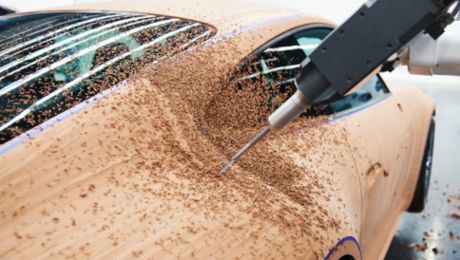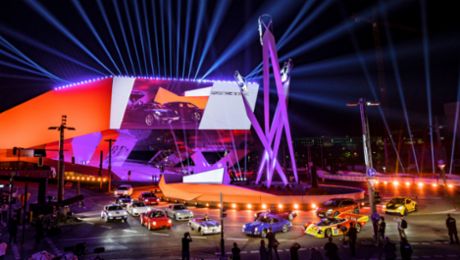Adjustment of the material supply mainly depends on the pace of the assembly cycle (or "takt" in technical terminology). Internal processes for providing materials in the plant, as well as taking deliveries from suppliers invariably follow the same basic principles, i.e. the individual vehicle order and its defined time and sequence data within the manufacturing workflow. "This is the only way to manage production of the entire diversity of models for all the two-door sports cars derivatives on one assembly line," said Volker Guckenhan, Head of Plant Logistics at Zuffenhausen.
Perfectly tuned to the pace of the assembly cycle at Porsche
At present, about 560 series production suppliers deliver components to the main plant. Co-operation with suppliers is perfectly tuned to the pace of the assembly cycle at Porsche. This starts with fully synchronous production at the supplier's plant – i.e. at the same time and in exactly the same sequence (actual sequence); it continues with ordering the components in the scheduled assembly sequence of the vehicles (planned sequence) and ends with needs-based supply according to the just-in-time principle. The scheduled assembly sequences for coachbuilding and assembly are defined six working days before the start of production.
"We adhere strictly to the agreed general conditions planned in advance to guarantee a buildable model mix at all times," emphasized Christian Reuchlen, Head of Logistics Management at the Zuffenhausen plant. The sequence of the cars defined at the start of assembly remains identical through to the end of the line. "Our aim is to ensure an orderly lean supply of materials," said Reuchlen. At present, the sequential stability in Zuffenhausen is about 98 per cent.
Logistics are based on the Porsche Production System
Logistics are based on the Porsche Production System (PPS), which was devised in the mid-1990s and has been continuously developed since then. "In the long term, we intend to establish our PPS as benchmark for the production of high quality cars in Germany," said Dr Oliver Blume. The PPS is based on four principles: the flow principle to implement assembly line production by coupling and aligning processes; the takt principle to create a rhythm by harmonising the work contents; the pull principle in which the next process in the line retrieves only the parts it needs; and the zero-defects principle, which is pursued within the company by improving and stabilising all of the processes.
"Transparency is a key factor for identifying and preventing potential defects," said Frank Seidl, Head of Production Systems at the Zuffenhausen plant. "Here, brand planners collaborate with developers at an early stage and coordinate the course of action with our plant planners to ensure innovative processes in the production of our sports cars." As early as 42 months before the start of production (SOP), joint workshops take place to shape the concept; 27 months before SOP, the workshops deal with product design and 12 months before SOP with process design.
Correct communication is decisive
Correct communication is decisive in the workshops as well as in normal series production. "Our daily coordination meetings at all management levels ensure that communication is continuous from employees in production through to management," said Seidel. With regard to transparency, a pilot project is currently testing a shop floor management system in the paint shop. The system is based on the philosophy of "on-site leadership". A team board and a process control board display information about quality, qualification schemes, shift plans, problems and quantities. The two boards are updated every day, in other words they are revised by the team leader, foreman and the team. Seidel explained: "In this way, changes can be incorporated promptly and all the staff involved always have same information."
In Part 3 the Porsche Newsroom will describe how top product quality is ensured.



